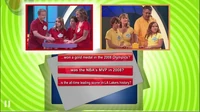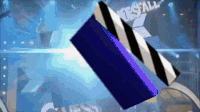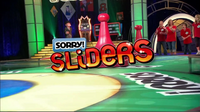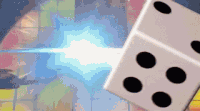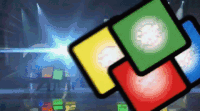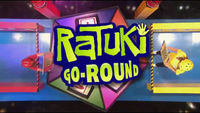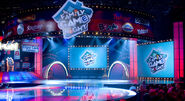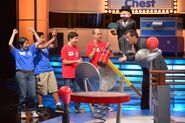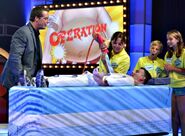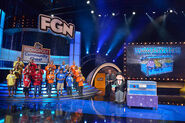| Host | |
| Todd Newton | |
| Announcers | |
| Burton Richardson (Seasons 1-2) Stacey J. Aswad (Season 3) Andrew Kishino (Seasons 4-5) | |
| Broadcast | |
| The Hub/Discovery Family: 10/10/2010-11/9/2014 | |
| Packagers | |
| Zoo Productions all3media America (2014) Hasbro Studios | |
OPENING SPIEL #1 (Seasons 1-2): "Tonight, we're playing the games that you love to play with your family in a whole new way... (insert five games of the day). The games are bigger, the stakes are higher, and (the) moments are priceless. Right now on Family Game Night! And now, here's your host, Tooooooooooooooooodd Newton!" - Burton Richardson
OPENING SPIEL #2 (Season 3): "Tonight, members of our studio audience are here to play some of your favorite games in a whole new way... (insert four games of the day). The games are bigger, the moments are priceless, and one lucky family might just leave here with a brand-new car. Right here on Family Game Night." - Todd Newton
OPENING SPIEL #3 (Seasons 4-5): "Tonight, members of our studio audience are here to play some of your favorite games in a whole new way... (insert five games of the day). The games are bigger, the moments are priceless, and one lucky family might just leave here tonight with a brand-new car. Plus, a celebrity family will play one of our games, right here on Family Game Night: Celebrity Edition! And now, here's your host, Toooooooooooooooooodd Newton!" - Andrew Kishino
NOTE: Only words in bold are in the Celebrity Edition of the show in Season 5.
Family Game Night was the family game show in which America's favorite classic board games come to life, and presented in new ways never seen before.
Format #1 (Seasons 1-2)[]
Two families (one dressed in red and the other dressed in yellow) compete in a series of games based on Hasbro's most popular board games. Five games are played each show. Each time a family wins a game, they win a prize (in season 2, they were referred to as "Monopoly Party Prizes") plus a choice of one of the 21 Monopoly Crazy Cash Cards from a shelf at what's called the "Monopoly Crazy Cash Corner" on the left of the set. Each family starts with one card each.
Toss-Ups[]
Each competition began with a toss-up round to see which family will be the first gets to pick the first card, the loser of the toss-up round picked their first card second.
- Season 1: Guess Who? - Unlike the normal board game, the families try to identify a famous celebrity real or fictional & past or present. Host Todd read clues to the celebrity one at a time. The first family to buzz-in with the correct identity won the right to pick a Crazy Cash Card first, but an incorrect answer from the buzz-in family gave the opposing team the first pick.
- Season 2: Cranium Brain Break - The families complete in a physical challenge for the right to pick a Monopoly Crazy Cash Card first.
Regular Games[]
Season 1[]
- Scrabble Flash - Five tile-like monitors (with a letter on each one) were placed on a table in front of the families. The families' job was to make 3, 4 & 5 letter words using the letters shown. They took turns, and if the word they make was legal, they scored as many points as there are letters. The first family to score 25 points won the game. Scrabble Flash later appeared as a game in a new show called Scrabble Showdown.
- Bop-It Boptagon - Each family member is placed at a "Bop-It" station (Twist-It, Pull-It, Shout-It, Kick-It, Whack-It, Honk-It, Crash-It, and the titular Bop-It). A command is given, and the person at the appropriate station must perform that command. If they are late in performing it, or they do it out of turn, they are eliminated. At random points, commands of "Rotate-It" or "Reverse-It" will be given, causing all players to move one space clockwise or counter-clockwise; during that time, players will be charged if they go the wrong way, go too far, overshot their station or skip their station. In case every alive player fails on the same command, they may still stay in the game. The last surviving family member(s) (on the same team) wins the game for their team.
- Cranium - One of four different "pillers" is put into play (on the pilot all were played), and the questions or clues are based around that piller. The majority of these pillers are played in different ways. Success in any of those pillers won points, and the family with the most points won the game. This game was seen in every single episode of season one.
- Data Head - This piller is all about general knowledge, sometimes identifying pictures:
- 1. Each team has two minutes to guess as many clues as possible, earning 10 points for each one.
- 2. Teams took turns answering questions with the first four questions going to the kids, and the second four going to the adults. Each correct answer is worth 10 points in round one & 20 points in round two.
- 3. All questions are toss-ups. The first team to buzz-in with a correct answer scores the points. If answered incorrectly, the opposing team had a chance to steal. Each correct answer is worth 10 points in round one & 20 points in round two.
- 4. (Guesstimator) Questions had numerical answers and were played just like the Card Sharks Hi-Lo toss-ups. Each question was worth 10 points, plus that much more for each new question.
- 5. (Who's Older) All questions are whether the Object or a Person is Older. The first team to buzz-in with a correct answer scores the points. If answered incorrectly, the opposing team automatically scores. Each correct answer is worth 10 points in round one & 20 points in round two.
- Creative Cat - To start, near the end of a segment, the child contestants took their own tables with wads of clay on them back stage. Each team of children had cards which told them what object they must make with the clay. Then after the break, the kids were brought back out with their works under the dome covers. Now one at a time, the kids' work was revealed, and the parents whose kids' claywork was revealed had 15 seconds to guess what the clay-made object is. A correct guess earned 10 points times the number of seconds leftover for a maximum total of 150 points. In the next round, it was the parents turn to do some creating. Only this time instead of shaping object out of clay, they drew objects; the catch was that they must draw blindfolded. Each parent had 15 seconds to draw the subject while the kids were guessing. Again, correct answers are worth 10 points times the number of seconds leftover, and with parents drawing individually, the maximum total was 300 points. Again, the family with the most points won the game. In the event that the first family was unable to catch up, the opposing family won without being able to draw; they won it by default. On the pilot, the dads were handed their clay at the start of the round, made their object, then brought it out at the end of the round, giving their families one chance to guess for 50 points.
- Star Performer - This one is centered around charades, and other forms of performance.
- 1. The kids have 30 seconds to convey as many activities to their parents as they can; each one is worth 20 points. This is done by having one child thread their arms through their siblings, acting as "their" arms.
- 2. On each answer, the dads have 30 seconds to yell it out while their teammates do charades on the on-the-floor video wall. The first round had players form letters and are worth 10 points, the second round sees players forming numbers which are worth 20, the third round is symbols which are worth 30, and finally the charaders form general things with each correct answer worth 40 points.
- 3. (Cranium Piano) The families faced music keypad with five notes numbered & colored. 1-Blue, 2-Red, 3-Green, 4-Yellow & 5-Purple. This is a simon-like game where the player who made a mistake forfeited the points to his/her opposing family. The kids played first and they must add one note at a time; their round is worth 10 points. The adults played second, but they must add two notes at a time; their round is worth 20 points.
- Word Worm - This pillar is the focusing of words.
- 1. (Word Wipe) A word is revealed from either the top or bottom, and the kids buzz in to guess, each word is worth 30 points.
- 2. (Backwards) In round one, the kids faced off in a buzz-in round. Words would be revealed a letter at a time backward (from right to left), and each time a team, buzzed in with the right word they scored 10 points; but if they buzzed in and they're wrong, the opposing team would be shown one free letter and offered a free guess. In round two, the adults teams each played a 60 second spelling bee except that they must spell backward and alternate turns in giving letters. Host Todd would announce the word and then the parents in control must correctly pong backward spell that word. Each correct backward spelling is worth 20 points.
- Data Head - This piller is all about general knowledge, sometimes identifying pictures:
- Guesstures Freefall - Three family members are suspended above the floor above a "Guesstures" logo, and must convey clues about a person, place, or thing to their partner, who has two minutes to guess as many as they can, earning ten points for each one. The player can pass, but each time they do, the suspended family member briefly drops to the ground; they are brought back up before their next turn. If any of the clue givers mouthed a word, that word is disqualified. The family with the most points won the game, but if the game ended in a tie, the family who passed the fewest times won. At least one earlier taping had each family play for 45 seconds, and all three actors acted at the same time; the guesser can only pass up to three times, and for every 15 seconds, that's when an actor dropped. Another version gave the partner 90 seconds to guess as many as they can; the youngest will act out clues worth 10 points, then the older kid and clues are worth 20 points and a Parent and clues are worth 30 points, and every 30 seconds, actor dropped.
- Connect 4 Basketball - The families face the familiar Connect Four game board, each member grabbing a red or yellow volleyball, and shooting it at the board. Each family member always take turns of throwing the volleyball. Before each shot, they call their shot, though calling it wrong will not be counted against them. Just like in normal Connect 4, the object of the game is to get four balls in either a horizontal, vertical, or diagonal pattern. The first family to do so wins. On the pilot, both teams (one member from each team) shot at the same time, and it was played as a best two-out-of-three.
- Bounce 'N Boogie Boggle - The family faces a "Boggle" grid; twenty-five letters are revealed, and each player searches for words that can be constructed from sequentially adjacent letters, horizontally, vertically or diagonally neighboring. Words must be at least three letters long, may include singular and plural (or other derived forms) separately, but may not use the same letter cube more than once per word (that means stepping on the same letter twice for beginning to end), use two letters long, repeats a word, taking too much time, using misspelled words, unconnected words or backtracking. The grid is a monitor built into the floor, one member from each team takes turns jumping onto the letters to spell out the words. Each acceptable word is scored at one point per letter, and whichever family has the higher score after two minutes wins the game. In case of a tie, teams take an equal numbers of turns starting with the next player in line and the team to make the longer word (the one with the most letters) wins. In addition, a "bonus" word is revealed to the folks at home; if a family can find this word, they win a bonus prize (no bonus prize was offered in the pilot).
- Sorry! Sliders - Combining elements of Shuffleboard with the classic game, each team slides a giant Sorry! playing piece toward a target; outer section is worth 1 point, middle 3, bull's-eye 5. The piece must touch a section to count. The opponent's job is to use their own Sorry! piece to knock their opponents piece out of the target toward a "Sorry!" zone, worth no points (and prompts the audience to shout out "Sorry!"). The teams play the best two out of three, the third round if needed, is one-slide, high score wins. In Season 2, "Prize Dots" were added, one for each team they are allowed to place it anywhere except on the bull's eye; landing on your own won a bonus prize. Landing on the opponents won no prize & no points.
- Yahtzee Bowling - Essentially played the same as the regular game; but instead of using dice & a cup, the teams roll a giant bowling ball toward five six-sided dice-type pins, with one family member standing opposite of the pins ready to determine a score. When the pins are knocked down, the side that's facing towards the ceiling's overhead camera is the number recorded for the score. The game is played with the bottom half of the scoring sheet; but instead of scoring by points, they score by higher hand; so their job was to build the best dice hand possible. Scoring a Yahtzee wins a bonus prize. Winning two frames out of three wins. If there's a tie at one frame apiece, the teams played a bowl-off frame; best hand wins.
- Twister Lights Out - The board is basically the same as always except the dots are not divided into colored columns; they go diagonally. After each command has been determined on the Twister video wheel, the colored dots on the gameboard will disappear in a clockwise pattern, starting w/ the outside edge. If anybody's incorrect or they move to a blank space, they're eliminated. Like Bop It! Boptagon, the last team (member) standing wins a round for his/her family, but in this game, whoever wins two out of three wins.
- Operation Relay - The families play individually in this game. Members of the family in control took turns playing this game like a relay race. One member of the family faced the Operation board. He/she took the tweezers in hand and pulled out one of the suffering items (Funatomy Cavities) on the board. Once that player did that, he/she ran through an obstacle course and placed the object on a different board next to the picture of the piece he/she got. Completing the task earned points according to the item grabbed; the more difficult trying to take out the piece, the higher the point value. Should a family member touch the sides, or knock over any obstacle, that player loses his/her turn and goes back to the line. Each family has two minutes, and the family with the most points won the game.
Season 2[]
- Cranium - Instead of four different "pillers", only three Cranium games were put into play.
- Guesstimator - Similar to the educated guess questions on Card Sharks, one team is given a question that has a numeric answer. The other team must then predict if the actual answer is higher or lower than the first team's guess. The kids play first for questions worth 10, 20, 30 and 40 points; then the adults play more difficult questions for double points. Highest score wins. If there is a tie, one final question is read, and each team makes a numeric guess, with the closest guess winning.
- Cranium Who's Older - Teams take turns being shown a pair of people and/or things and identifying which one is older. Right answers scored points; wrong answers gave the points the opposing team. The kids play four questions worth 10 points each, then the adults play four questions at 20 points a question. Highest score wins. If there is a tie, one final question is played, and the team that buzzes in first gets to answer, with the winner determined by their right or wrong answer.
- Cranium Piano - The families faced a music keypad with five notes numbered & colored: 1-Blue, 2-Red, 3-Green, 4-Yellow & 5-Purple. This is a Simon-like game where the player who made a mistake forfeited the points to his/her opposing family. The kids played first and they must add one note at a time; their round is worth 10 points. The adults played second, but they must add two notes at a time; their round is worth 20 points.
- Simon Flash - The families are dressed up as Simon Flash cubes, each with a different color. A sequence of four colors is shown. The family has to arrange themselves in the correct order. First family to do this five times wins.
- Trouble Pop Quiz - The kids on a team are asked a number-based question and have to use a giant Pop-o-Matic to answer. First person to do this moves one of their parents that many spaces on the board. Be careful, though, because if a parent lands on a space another team’s parent occupies, the opposing parent goes back a space and the audience will yell "TROUBLE!". Both parents must finish in the finish zone for the team to win.
- Ratuki Go Round - Teams face a spinning pentagonal spinner with card holders on each side. Team members take turns placing their card on the ones that are higher or lower than the number on the card in the holder and it doesn't matter whether its their team's card or their opponents card. Should a player place an illegal card (one that's not higher or lower), that player gets frozen out for 10 seconds. As soon as one team runs out of cards, the next team in line must then place the game winning five card on a four card and thereby win the game. Midway through the season, the rules was adjusted. If the family places the wrong card, their opponents will automatically win the game. In addition, regular 5's have been added to the team's decks. If they place a 5 card, their opponents freeze for 10 seconds. The final 5, however, must still be played last in order to win.
- Operation Sam Dunk - This version of Operation is a Skeeball game. Family members will take two turns each rolling a ball into one of the Funatomy Cavities and earned points according to what the cavity is worth: Left Shoulder (Bird Brained) = 100, Lower Chest (Burp Bubbles) = 150, Lower Left Stomach (Phone Finger) = 200, Lower Right Stomach (Toxic Gas) = 250, Right Shoulder (The Giggles) = 300, Throat (From in the Throat) = 350. In addition, there is a bell located above Sam, hitting it doubles the current score. Highest score wins.
- Green Scream - With the kids dressed up in green bag-like outfits, the parents from each family get one minute and thirty seconds (1:30) to identify up to ten hidden pictures in a "green screen" effect. The kids help their parents by rolling around in the "Green Scream" circle to reveal portions of the picture, while the parents can see the kids actions on the monitors. Each correct answer is worth 10 points for a possible total of 100 points. The parents in control can pass on a picture if they get stumped, but if they do, they cannot come back. The family to get the most points out of 100 points won the game.
- Spelling Bee - The moms are dressed as bees, with markers for the "stinger". Using those markers, they must draw a word one letter at a time; the families can shout anything. The moms are not allowed to talk, or else the word is disqualified. They are, however, sometimes encouraged to make "buzzing" noises like a bee. If not guessed correctly by the third letter, Todd provides a clue. Each word is worth 100 points, and each team had 1:30. Highest score wins. If there is a tie, the family that correctly guessed their words in the fastest time wins.
Monopoly Crazy Cash Cards[]
In addition to winning a prize, the youngest child team captain of the winning family of each game, selects a "Monopoly Crazy Cash Card"; each one is printed with a Monopoly playing piece, and each containing random cash values. Most of them have amounts between $100 & $1,000 (in $5 increments), some of them have amounts more than $1,000, and only one had the biggest amount ranging between $7,500-$25,000. At the end of the show, the cards are entered into a "Monopoly Crazy Cash Machine" to reveal the value of each card. Upon revealing the dollar amount, Monopoly money would spit out of the machine and onto the stage floor; families would usually go wild in it whenever it occurred. The family with the biggest cash total wins a trip. If both families are tied, both families win the trip.
If the card with the biggest amount was not chosen nor revealed, Todd would reveal which card it was.
Regardless of how they did, both families get to keep all the cash & prizes they won on the show.
Format #2 (Season 3-5)[]
Instead of just two families, multiple families (regardless of color) randomly selected from the studio audience. In Season 3, they played four games, Seasons 4 and 5 played five games. Some were head-to-head and some were solo games. In Seasons 4 & 5, losing teams received $100. Six of the games seen in the first format remained though two of them were played differently. All of the families who played get to choose a combination card from a set held by a statue of Rich Uncle Pennybags/Mr. Monopoly, to be used for the Community Chest. Each card consists of three colors out of five (red, blue, green, yellow and orange) One of them has the right combination that opens up the Community Chest and gives the family that picked it the right to play the revised Monopoly Crazy Cash Card game. In Season 5, celebrities and their families played one game for charity; they were guaranteed $5,000 with a win awarding an additional $5,000.
Games[]
Season 3[]
- Battleship - The players stand behind podiums with a button. On the "On the Floor" video wall floor is a grid consisting of six ships (3 cruisers, 2 submarines and the battleship) which are hidden under 25 coordinates that the players call out before pressing the button and launching a virtual peg from the video screen in the background. Once the players call out the coordinate, the audience always does the countdown (3, 2, 1, Launch!) before the player pushes the button. Each hit sinks a ship and the first team to sink three ships wins the game and a prize package. If the game was a perfect game (both teams sunk three ships in three moves), then both teams win.
- Sorry! - This is now played more like the old board game. The parent was dressed to look like a Sorry! playing piece/pawn and stands at a big pathway full of dollar amounts ranging from $100-$900. The child contestant faced a board of ten colorful Sorry! cards. Eight of them have numbers 1-4 which will move the parent down the path, but the remaining two are Sorry! cards, the bad cards. The child contestant picked a card by its color and if it was a number card, the parent gets to move down the appropriate number of spaces. Each cash amount landed on will be added to the family's total. If at any time a Sorry! card was picked, the family loses the money but continues on back to the start, but if the second Sorry! card is drawn, the game is over. That's why, to prevent this from happening, the family was offered the right to stop the game after each number card and keep any money won up to that point. However, if the parent reaches the finish space, the family wins a grand prize plus the cash. On a celebrity playing, the dollar amounts were replaced with numbers 1-9.
- Simon Flash - see above
- Yahtzee Bowling - Played the same way except one family is playing and there are fewer combinations involved (3 of a kind, Full House, Large Straight, 4 of a kind, and the aforementioned "Yahtzee"). Each combination has a prize attached worth a higher value. Whatever combination was made after three turns was the prize the family gets.
- Connect 4 Basketball - see above
- Operation - Similar to Operation Sam Dunk, except the points have been replaced with money: Left Shoulder (Bird Brained) = $400, Lower Chest (Burp Bubbles) = $300, Lower Left Stomach (Phone Finger) = $600, Lower Right Stomach (Toxic Gas) = $500, Right Shoulder (The Giggles) = $700, Throat (Frog in the Throat) = $800, Bell (Ringing of the Ear) = $1000. Any miss is worth $100. In addition, the game's divided into two parts. A parent is placed in a body cast for the first part & their teammates' job is to successfully remove a chosen ailment w/ some giant tweezers. They're given one ball for free & can win up to three more. Originally, in Season 3, all money was put on a gift card; later on, in Seasons 4 and 5, all money was awarded in cash. Either way, the maximum amount possible was $4,000.
- Bop-It Boptagon - In this version's Boptagon some of the stations remain and some are retired & replaced with new stations; they are: Pull-It (now represented by a rope), Kick-It, Whack-It, Honk-It, Crash-It, Chop-It, Squeeze-It and the titular Bop-It. Four contestants on two teams play this game and the contestants playoff one at a time, starting with the kids and ending with the adults. Each player has 30 seconds to perform as many of the commands as they can. Each correct command scored a point for his/her team, the team with the highest score wins the game; if the game ends in a tie, the team whose kid performed the first command the fastest is declared the winning team. The winning team won a prize package. In season four, Kick-It, Whack-It, are both replaced with two stations: Lift-It and Dunk-It.
- Twister Lights Out - Same as always except for the following: The wheel is basically the same except each section (represented by which hand and which foot) now has an extra circle with a cloud contained; they represent the command of "air", meaning that the body part called for must come off the board and in the air. Also instead of disappearing clockwise, the dots disappear by frame; plus there is a warning light signifying when dots are about to vanish.
Season 4[]
- Monopoly Remix - This is the first ever Monopoly game, other than the Crazy Cash segment to be played in the main rounds. One family plays on a MONOPOLY-style board on the On-the-Floor video wall with two property spaces — Boardwalk and Park Place — and starts with $1,000. In the first round, Boardwalk and Park Place are shuffled amongst two penalty spaces — Luxury Tax and Income Tax. Family members use keen vision and extreme concentration to follow the properties as they are rapidly shuffled around the playing field. If the family accurately identifies and places their jumbo-sized hotels where Boardwalk and Park Place landed on the game board, they keep the $1,000. If the family places their hotels on the penalty spaces, they pay $300. There are three rounds with an additional penalty space added and raised fines after each round, $400 & a Street Repair space for round two, $500 and a Bankrupt space for round three. If the family has any money left at the end of the game, they win the remaining money and a prize. On a celebrity playing, the (remaining) Monopoly money was augmented to $10,000 if the game was won.
- Jenga - Two of the numbers 1, 2, and 3 are placed in a drum, representing how many blocks must be removed. Once a number is pulled, the teammate must remove a block from an oversized Jenga tower and pass it to their partner, who must place it on top of the tower, once that's done, their partner must repeat the process. Once all the blocks have been removed and placed, the team hits a button to stop their personal clock, which starts at two minutes. Then it's the other team's turn. A team can be given a five second penalty if a member of the team starts too soon. After each team has a turn, a 0 is added to the drum. If the tower falls, or their clock runs out, the opposing team wins a prize package. For the final season, the number chips were replaced with Jenga blocks with the numbers printed face down.
- Yahtzee - This is the replacement for Yahtzee Bowling. A question with six possible answers is presented. It's a 50/50 split meaning that three are right & three are wrong; every correct answer changes the ones, twos, and threes on each virtual die to the word "WILD". Standard rules apply; rolling a Yahtzee in three rolls or less wins a trip. In the first season with this, the answers were on cards; the last season saw the answers appear on monitors with the question appearing on the big monitor facing the audience.
- Barrel of Monkeys - The family is faced with ten lettered barrels from A-J. Inside the barrels are chains of monkeys from one to ten. Also in the game are five colored trees (yellow, blue, green, white & red). The yellow tree represents the lowest spot for the monkeys and the red represents the high. The object of the game is to place chains of monkeys in proper order from low to high. The family chooses a barrel to release a chain of monkeys which is done by a virtual vine grabbing virtual monkeys. Each time a monkey chain is released, the family then gets to decide which tree to place it on. But they have to place it strategically because if at any time they get a chain that's out of sequence, the game is over. But to assist them in placing monkey chains in order, one of the barrels in addition to the chain contains a bunch of bananas. If they pick that barrel, those bananas represent a "freebie" to be used should they go out of sequence at any time including with the one just picked. If the family can place the chosen monkey chains in proper order, they win a trip.
Celebrities[]
These are a list of celebrities that appeared during the celebrity season:
| Date | Celebrity | Game | Award |
|---|---|---|---|
| 8/3/14 | Jon Heder | Monopoly Remix | $10,000 |
| 8/10/14 | Marissa Jaret Winokur | Sorry! | $5,000 |
| 8/17/14 | Melissa Rivers | Yahtzee | $10,000 |
| 9/7/14 | Niecy Nash | Yahtzee | $10,000 |
| 9/21/14 | Tracey Gold | Barrel of Monkeys | $5,000 |
| 10/19/14 | Lorenzo Lamas | Yahtzee | $10,000 |
| 11/2/14 | Joey Lawrence | Barrel of Monkeys | $5,000 |
| 11/9/14 | Marlee Matlin | Barrel of Monkeys | $5,000 |
The Community Chest[]
After all the games have been played, the families that played those games all tried out their combination cards. In season three, the colors were on three wheels to which the kids spun to the appropriate colors. In season four the chosen colors appear in lights which is done by sticking the chosen card into the slot. After the combination was set, the kid of the family pressed the button to see if the combination worked. Whichever family drew the right card with the right combination and opens up the chest plays a bonus round for cash and a new car.
The Monopoly Crazy Cash Card Bonus Round[]
The winning family faces the Monopoly Crazy Cash Machine. Instead of 21 cards, there were 16 cards arranged in a 4x4 grid. Nine of the cards were cash cards and one was a WIN card located on the top row. The remaining six cards were GO TO JAIL cards: one in the 2nd row, two in the 3rd row and three in the top row. The winning family tries to work their way to the top row. If the family picked a cash card, they won the amount of cash on the card and goes to the next row above to pick another card. If the family picks a GO TO JAIL card the game is over. But if they reached the top row and found the WIN card, they won a new car (Jeep Patriot in Seasons 3 & 4, Ford Escape in Season 5). Regardless of the outcome, the winning family kept all the cash they won; and if they didn't get into the top row, Todd would reveal which one was the WIN card.
Inventor[]
Based on several proprietary board games by Hasbro, Milton Bradley, Parker Brothers, Lowe, Irwin, Kohner and Selchow & Righter.
Four of the games (Scrabble Flash, Simon Flash, Sorry Sliders & Monopoly Crazy Cash) are real games currently out on the market.
Gallery[]
Merchandise[]
As seen above, Electronic Arts in conjunction with Hasbro released video game ports of the show under the title Family Game Night 4: The Game Show for the Nintendo Wii, Sony Playstation 3 and XBox 360 in November 2011; The PS3 and XBox 360 versions allows the support of motion controllers, which is required for the Wii.
Rating[]
Studio[]
Trivia[]
Despite having a four-year only run, this was the second most successful "board-game-turned-game-show" in history, the first was Scrabble (1984-90 version) hosted by Chuck Woolery, the third was Celebrity Name Game hosted by Craig Ferguson in 2014 until 2017 and the fourth was 25 Words or Less hosted by Meredith Vieira since 2019.
A similar sounding name Family Game Fight! (premiering in 2021) hosted by celebrity husband and wife team Kristin Bell & Dax Shephard is a reference to this show in general.
Link[]
YouTube Videos[]
A playing of Operation Sam Dunk
A playing of Battleship
Promos[]
Promo for Season 2 of Family Game Night
Promo for Season 3 of Family Game Night
Promo for Season 4 of Family Game Night
Promo for Season 5 of Family Game Night

